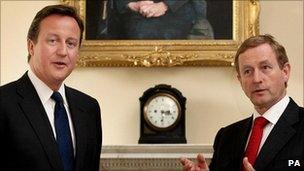Cameron hails UK-Irish 'relationship of opportunity'
- Published

Mr Cameron and Mr Kenny met in Downing Street in April
David Cameron has hailed a "relationship of opportunity" between the UK and Ireland on his first official visit to Dublin.
The prime minister held talks with his Irish counterpart Enda Kenny, afterwards describing the countries as "close friends".
Mr Kenny said he was "very happy" that the relationship was developing.
Mr Cameron will attend a state dinner with the Queen and Duke of Edinburgh, who are on a four-day visit.
It is the first trip to the Republic of Ireland by a reigning UK monarch since the country gained independence.
After his meeting with Mr Kenny, Mr Cameron said the visit demonstrated that "the relationship can get stronger" between the two countries.
'Sensitivity'
It was a "relationship about trade, investment and the economy" and a "relationship of opportunity between close neighbours and close friends".
He added that the Queen had shown "enormous sensitivity" to the troubled history between the UK and Ireland during her visit.
Mr Cameron met the Taoiseach in Downing Street in April, but this was the pair's first meeting on Irish soil since Mr Kenny came to office in March.
Mr Kenny earlier told the Irish parliament he would speak to Mr Cameron about the release of government files on the 1974 Dublin and Monaghan bombings.
Relatives of those killed in the attacks believe there was British state collusion in the attacks.
No group claimed responsibility for the Dublin and Monaghan bombings in which 33 people died, but loyalist paramilitaries were blamed.
However, the Justice for the Forgotten campaign, which represents survivors, believes secret British files could reveal evidence that actions by security forces and police amounted to collusion.
The group wrote an open letter to the Queen, coinciding with her visit, in which it appealed through her to Mr Cameron, asking him to commit to "a genuinely significant gesture of reconciliation" by opening the files.
"Without this move, deeply troublesome questions remain unanswered," the letter said.
- Published18 April 2011
- Published18 April 2011
- Published27 February 2011